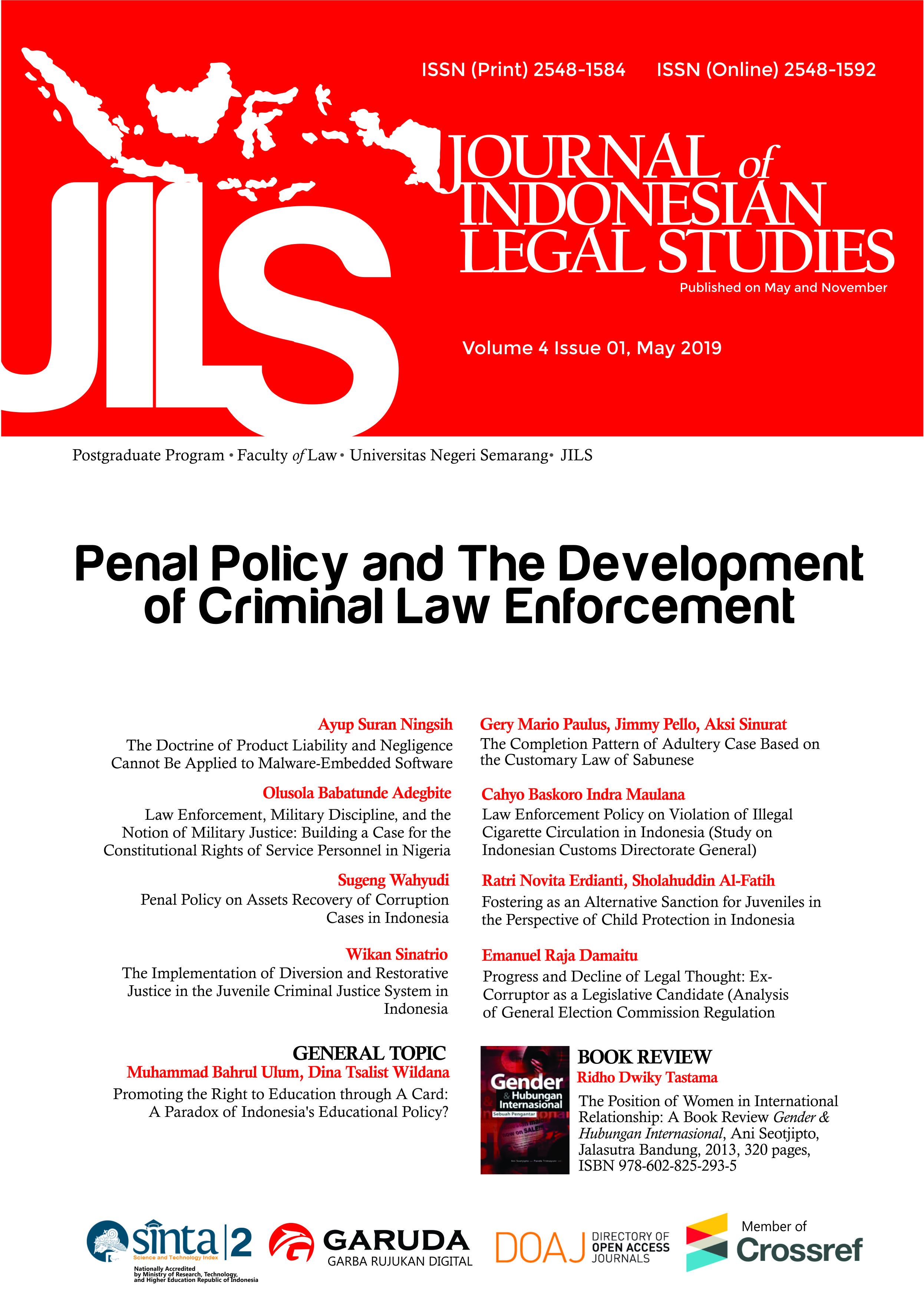The Completion Pattern of Adultery Case Based on the Customary Law of Sabunese
Main Article Content
Abstract
Adultery, according to Sabu Society is relations between a man who is bound a custom matrimony or religious marriage with a woman who is bound a matrimony or one of them has bound in a matrimony. Adultery, based on the positive law is ruled in chapter 284 book of Undang-Undang Hukum Pidana (KUHP). Chapter 284 KUHP has the point that a man or woman who has been married and doing adultery (overspel). The point in chapter 284 KUHP has similarity with the point in customary law of Sabunese, namely adultery is conducted with someone (man or woman) who has been joined in matrimony. Based on the research has been done, it found that the people of Sabu is prefer to completing adultery customarily because of some factors, that is: sanction and serious fine, it is normally using the completion customarily with the people of Sabu,the justice law based on the people of Sabu, the effect of completion and completion pattern. Two patterns of completion which appears in completion process of adultery based on the customary law of Sabu is the completion pattern in kinship way which are preventing and protecting.
Article Details

This work is licensed under a Creative Commons Attribution-ShareAlike 4.0 International License.
All writings published in this journal are personal views of the authors and do not represent the views of this journal and the author's affiliated institutions. Author(s) retain copyrights under the licence of Creative Commons Attribution-ShareAlike 4.0 International (CC BY-SA 4.0).
References
Bahiej, A. (2003). “Tinjauan Yuridis atas Delik Perzinahan (Overspel) dalam Hukum Pidana Indonesiaâ€. Sosio-Religia 2(2): 1-21.
Berlian, S., Andrisman, T., & Warganegara, D. (2019). “Mediasi Penal Melalui Lembaga Adat dalam Penyelesaian Kasus Perzinaanâ€. Jurnal Poenale, 7(1): 1-12.
Brenner, S. (2006). “Democracy, Polygamy, and Women in Post-Reformasi Indonesia.†Social Analysis, 50(1): 164-170. DOI: https://doi.org/10.3167/015597706780886094
Burns, P. (2007). “Custom, that is Before All Lawâ€. In The Revival of Tradition in Indonesian Politics: 88-106. London: Routledge.
Chirayath, L., Sage, C., Woolcock, M. (2005). Customary Law and Policy Reform: Engaging with the Plurality of Justice Systems. Washington, DC: World Bank. Available at https://openknowledge.worldbank.org/handle/10986/9075
Crouch, M.A. (2009). “Religious Regulations in Indonesia: Failing Vulnerable Groups?†Review of Indonesian and Malaysian Affairs, 43(2), Available at SSRN: https://ssrn.com/abstract=1601065
Dading, M. A. (1982). Hukum Pidana Bagian Khusus (KUHP Bagian II). Bandung: Alumni.
Dake, L. C. H. (2015). “Tradisi Cium Hidung: Studi Antropologis–Teologis terhadap Budaya di Pulau Sabu, Nusa Tenggara Timurâ€. Doctoral Dissertation, Salatiga: Program Studi Teologi FTEO-UKSW).
Haq, H. S., & Sumanto, H. (2017). “Mengukuhkan Eksistensi Hukum Adat dalam Sistem Hukum Indonesia (Studi terhadap Pengembangan Kelembagaan Mediasi Komunitas)â€. Jurnal Yustisia Merdeka, 2(2): 15-26.
Holzner, B. M & Oetomo, D. (2014). “Youth, Sexuality and Sex Education Messages in Indonesia: Issues of Desire and Controlâ€. Reproductive Health Matters, 12(23): 40-49. DOI: https://doi.org/10.1016/S0968-8080(04)23122-6
Imanuel, G. L. (2013). “Penerapan Hukum Pidana Adat dalam Hukum Indonesiaâ€. Lex Crimen, 2(5): 122-129.
Jaya, N. S. P. (2016). “Hukum (Sanksi) Pidana Adat dalam Pembaharuan Hukum Pidana Nasionalâ€. Masalah-Masalah Hukum, 45(2): 123-130.
Krisnawan, I. B. M. D. (2015). “Tindak Pidana Kesopanan Dibidang Kesusilaan (Perzinahan) dalam KUHP Serta Padanannya dengan Hukum Pidana Adatâ€. Jurnal Magister Hukum Udayana (Udayana Master Law Journal), 4(2): 281-291. DOI: https://doi.org/10.24843/JMHU.2015.v04.i02.p08
Lamintang, P.A. F. (1990). Delik-delik Khusus: Tindak Pidana-tindak pidana yang Melanggar Norma-Norma Kesusilaan dan Norma Kepatutan. Bandung: Mandar Maju.
Masril, M. (2014). “Jenis Hukuman dalam Hukum Pidana Indonesiaâ€. Jurnal Ilmiah Mizani: Wacana Hukum, Ekonomi Dan Keagamaan, 1(1): 1-10.
Missa, L. (2010). “Studi Kriminologi Penyelesaian Kekerasan dalam Rumah Tangga di Wilayah Kota Kupang Propinsi Nusa Tenggara Timurâ€. Doctoral Dissertation, Semarang: Universitas Diponegoro.
Nawawi Arief, Barda. (1996). Bunga Rampai Hukum Pidana. Bandung: Citra Aditya Bakti.
Pigalao, J. H. (2004). “Hak Mewaris Anak Perempuan dan Perikembangannya dalam Hukum Waris Adat Sabu di Kabupaten Sumba Timur-Nusa Tenggara Timurâ€. Doctoral Dissertation, Semarang: Program Pascasarjana Universitas Diponegoro.
Pramesti, D. I. (2008). “Politik Hukum Pidana Terhadap Perbuatan Zinahâ€. Doctoral Dissertation, Surabaya: Universitas Airlangga.
Raharjo, T. (2010). “Mediasi Pidana dalam Ketentuan Hukum Pidana Adatâ€. Ius Quia Iustum Law Journal, 17(3): 492-519.
Rizal, P. (2017). “Reformulasi Tindak Pidana Perzinahan dalam Sistem Hukum Pidana Indonesiaâ€. Jurnal Jatiswara, 32(1): 129-146. DOI: https://doi.org/10.29303/jatiswara.v32i1.75
Soesilo, R. (1996). Kitab Undang- Undang Hukum Pidana Serta Komentar-Komentarnya Lengkap Pasal Demi Pasal. Bogor: Politeia.
Susiatiningsih, S. (2006). “Tindak Pidana Perzinaan Menurut Pasal 284 KUHP (Analisa Yuridis Normatif Berdasarkan Hukum Pidana Islam)â€. Doctoral Dissertation, Malang: Universitas Muhammadiyah Malang.
Upara, A. R. (2014). “Penerapan Sanksi Pidana Adat Terhadap Pelaku Tindak Pidana Zina Ditinjau dari Hukum Pidana Adat dan Hukum Pidana Nasional Pada Masyarakat Adat Tobati di Jayapuraâ€. Legal Pluralism: Journal of Law Science, 4(2): 143-164.
van Klinken, G. (2014). “The Seductress (1955–1965)â€. In The Making of Middle Indonesia: 153-181). Leiden: Brill.
Zulfa, E. A. (2010). “Keadilan Restoratif dan Revitalisasi Lembaga Adat di Indonesiaâ€. Indonesian Journal of Criminology, 6(2): 182-203.
